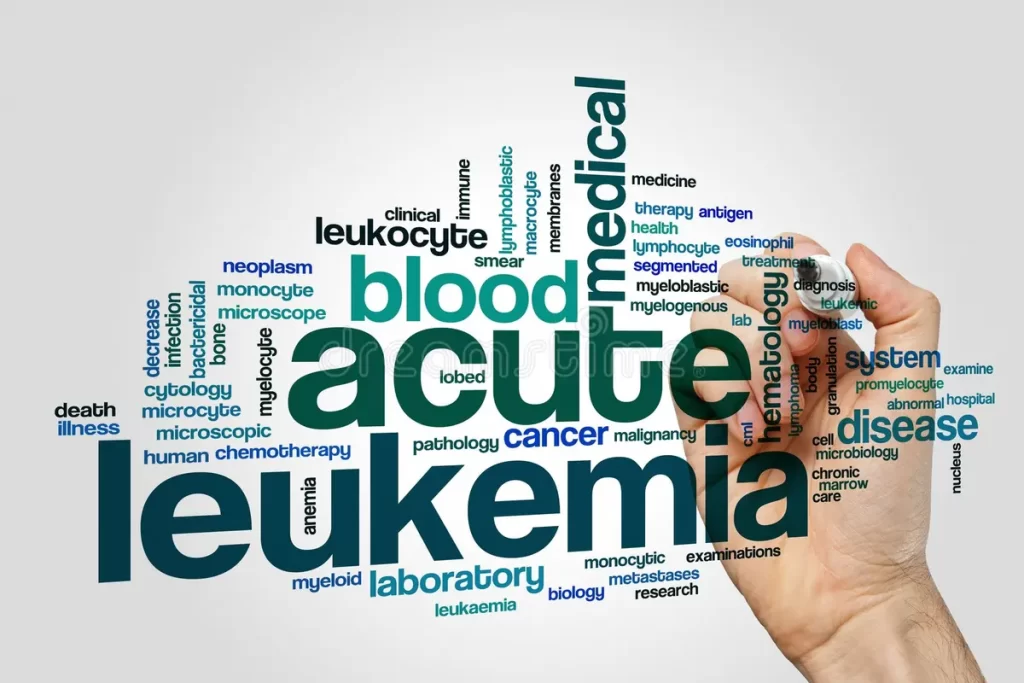CLL disease, blood cancer, white blood cells, treatment, symptoms, diagnosis, Chronic lymphocytic leukaemia, CLL treatment options, CLL prognosis, Causes of CLL, Advances in CLL research, CLL, blood cancer, treatment, CLL survival rate.
6. Promising Advances in CLL Research: Hope for the Future
Exciting breakthroughs and ongoing research in CLL (chronic lymphocytic leukaemia) offer hope for improved treatment outcomes and potential advancements in managing this complex disease. Here are some promising areas of CLL research that provide optimism for the future:

- Targeted therapies: The development of targeted therapies has revolutionized CLL treatment. Medications like ibrutinib, idelalisib, and venetoclax have shown impressive efficacy in clinical trials. Ongoing research aims to refine these therapies, explore combination approaches, and investigate new agents that target specific signalling pathways and proteins involved in CLL cell growth and survival.
- Immunotherapies: Immunotherapy continues to be an active area of research for CLL. Chimeric antigen receptor (CAR) T-cell therapy, a form of immunotherapy, has shown promising results in the treatment of CLL. CAR T-cell therapy involves modifying a patient’s own immune cells to recognize and attack CLL cells more effectively. Ongoing studies are refining this approach and exploring its potential benefits for a broader range of CLL patients.
- Minimal residual disease (MRD) assessment: MRD refers to the presence of a small number of remaining cancer cells after treatment. Researchers are focusing on developing more sensitive techniques to detect and monitor MRD in CLL. By accurately assessing MRD, doctors can make informed treatment decisions, potentially improving long-term outcomes and allowing for more personalized treatment approaches.
- Combination therapies: Researchers are investigating the efficacy of combining different treatment modalities, such as targeted therapies, immunotherapies, and traditional chemotherapy, to maximize treatment responses and overcome resistance. Combination approaches may enhance the effectiveness of individual treatments and potentially improve long-term remission rates.
- Genetic profiling and precision medicine: Advances in genomic sequencing technologies have allowed for a better understanding of the genetic changes and mutations associated with CLL. Researchers are studying how specific genetic alterations impact disease progression and treatment response. This knowledge may lead to the development of personalized treatment strategies tailored to an individual’s unique genetic profile.
- Clinical trials: Participation in clinical trials is critical for advancing CLL research and expanding treatment options. Ongoing clinical trials are exploring novel agents, treatment combinations, and treatment sequencing strategies. By participating in clinical trials, patients can contribute to the advancement of CLL treatment and potentially access cutting-edge therapies before they become widely available.
7. Living with CLL, Managing Symptoms and Maintaining Quality of Life
Living with CLL (chronic lymphocytic leukaemia) involves managing symptoms, maintaining overall well-being, and finding strategies to enhance the quality of life. While each individual’s experience with CLL may vary, here are some practical tips and strategies to help navigate life with this condition:
- Stay informed: Educate yourself about CLL, its symptoms, treatment options, and potential side effects. Stay updated on the latest research and advancements in CLL management. Understanding your condition empowers you to make informed decisions and actively participate in your treatment plan.
- Build a supportive healthcare team: Collaborate with a team of healthcare professionals, including haematologists, oncologists, and other specialists experienced in treating CLL. They can provide guidance, monitor your condition, and address any concerns or questions you may have.
- Communicate openly: Maintain open and honest communication with your healthcare team. Discuss any symptoms, treatment side effects, or emotional challenges you may be experiencing. Effective communication ensures that you receive the appropriate support and timely adjustments to your treatment plan, if necessary.
- Manage treatment side effects: Some CLL treatments may cause side effects that can impact your daily life. Work closely with your healthcare team to manage and minimize these side effects. They may recommend supportive medications, lifestyle modifications, or complementary therapies to alleviate symptoms such as fatigue, nausea, or pain.
- Prioritize self-care: Focus on maintaining a healthy lifestyle to support your overall well-being. Engage in regular exercise, eat a balanced diet, and get sufficient rest and sleep. These lifestyle choices can enhance your energy levels, improve your immune system, and promote overall wellness.
- Seek emotional support: Living with a chronic illness like CLL can be emotionally challenging. Seek support from family, friends, or support groups. Connecting with others who share similar experiences can provide a sense of understanding, empathy, and encouragement.
- Practice stress management: Chronic stress can impact your physical and emotional well-being. Find healthy coping mechanisms to manage stress, such as practising mindfulness meditation, deep breathing exercises, engaging in hobbies, or seeking professional counselling if needed.
- Maintain a balanced routine: Establish a routine that accommodates your needs and allows for rest and rejuvenation. Prioritize activities that bring you joy and fulfilment while ensuring you have ample time for self-care and managing your health.
- Stay connected: Maintain social connections with loved ones and engage in activities that bring you happiness and fulfilment. Participate in social events, pursue hobbies, and stay connected with your support network. Maintaining social connections can positively impact your emotional well-being.
- Follow up with regular check-ups: Attend regular follow-up appointments with your healthcare team to monitor your CLL and treatment response. These visits are crucial for assessing your condition, adjusting treatment if needed, and addressing any concerns that may arise.
8. What Types of Herbs, Spices and Household Items can be Useful for Patients of CLL?
While herbs, spices, and household items are commonly used for culinary and general well-being purposes, it is important to note that they should not be considered primary treatments for CLL (chronic lymphocytic leukaemia) or any other serious medical condition. The management of CLL typically requires medical interventions and close monitoring by healthcare professionals. However, here are some herbs, spices, and household items that are known for their potential health benefits and can be incorporated into a balanced lifestyle:
- Turmeric: Turmeric contains a compound called curcumin, which has antioxidant and anti-inflammatory properties. It may support overall well-being and can be added to various dishes or consumed as a supplement. However, consult with your healthcare team before taking any supplements, as they may interact with your treatment or have contraindications.
- Ginger: Ginger is often used for its anti-inflammatory and digestive properties. It can be enjoyed as tea, added to meals, or used in cooking. Ginger may help alleviate nausea or digestive discomfort that can arise from CLL treatments.
- Garlic: Garlic has been associated with various health benefits, including potential anticancer properties. It can be used to enhance the flavour of dishes and can be incorporated into a healthy diet.
- Green tea: Green tea is rich in antioxidants and has been studied for its potential health benefits. It can be consumed as a beverage and may contribute to overall well-being. However, it is important to note that green tea contains caffeine, so moderation is key, especially if you have any pre-existing medical conditions or are taking certain medications.
- Honey: Honey is a natural sweetener that can be used as an alternative to processed sugar. While it does not directly treat CLL, it can be a healthier option to sweeten foods and beverages compared to refined sugar.
- Aromatherapy: Certain essential oils, such as lavender, chamomile, or peppermint, may provide relaxation and stress relief. Aromatherapy techniques, such as diffusing essential oils or using them in massage oils, can promote a calming environment and support overall well-being. However, it’s important to use essential oils safely and consult with a qualified aroma therapist or healthcare professional before use.
Remember, it is essential to discuss the use of any herbs, spices, or household items with your healthcare team. Some substances may interact with medications or have contraindications, so it’s important to ensure their safe use within your overall treatment plan. Healthcare professionals can provide personalized guidance based on your specific health needs and potential interactions with CLL treatments.
Remember, CLL is a serious disease, but it is not a death sentence. With proper care, you can live a long and healthy life.
Every individual’s experience with CLL is unique. It’s essential to develop a personalized approach to managing your symptoms and maintaining a good quality of life. By actively engaging in self-care, seeking support, and staying informed, you can navigate life with CLL in a way that promotes your overall well-being.
In the final section of this article, we will provide additional resources and support networks for individuals living with CLL, helping you access further information and assistance as you navigate your CLL journey.
Disclaimer:
The information provided in this article is for educational purposes only and is not intended as medical advice. It is not a substitute for professional medical diagnosis, treatment, or care. Always seek the advice of your healthcare provider or qualified medical professional with any questions you may have regarding a medical condition.
While efforts have been made to ensure the accuracy and reliability of the information presented, no guarantee is made regarding its completeness, timeliness, or accuracy. The content of this article may evolve over time, and new research or medical developments may emerge that could alter the information provided.
Individuals with CLL or any other medical condition should consult their healthcare provider for a proper diagnosis and appropriate treatment recommendations. Each person’s medical situation is unique, and treatment decisions should be made in consultation with a qualified healthcare professional based on individual circumstances.
The use of herbs, spices, or household items mentioned in this article should not be considered a primary treatment for CLL. The management of CLL requires medical interventions and close monitoring by healthcare professionals. If considering the use of any herbs, spices, or household items, it is essential to consult with your healthcare provider to ensure they are safe and do not interfere with your treatment plan or any medications you may be taking.
The author and publisher, assume no responsibility for any adverse effects or consequences resulting from the use or misuse of the information contained in this article.
To Read Part Link
https://mrpo.pk/?p=1955&preview=true


